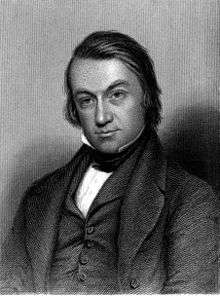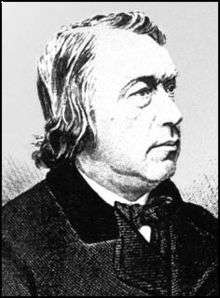Charles Mackay (27 March 1814 – 24 December 1889) was a Scottish poet, journalist, and song writer.
Quotes

Men, it has been well said, think in herds; it will be seen that they go mad in herds, while they only recover their senses slowly, and one by one.
Extraordinary Popular Delusions and the Madness of Crowds (1841)
- Every age has its peculiar folly: Some scheme, project, or fantasy into which it plunges, spurred on by the love of gain, the necessity of excitement, or the force of imitation.
- Men, it has been well said, think in herds; it will be seen that they go mad in herds, while they only recover their senses slowly, and one by one.
- He who walks through a great city to find subjects for weeping, may, God knows, find plenty at every corner to wring his heart; but let such a man walk on his course, and enjoy his grief alone — we are not of those who would accompany him. The miseries of us poor earthdwellers gain no alleviation from the sympathy of those who merely hunt them out to be pathetic over them. The weeping philosopher too often impairs his eyesight by his woe, and becomes unable from his tears to see the remedies for the evils which he deplores. Thus it will often be found that the man of no tears is the truest philanthropist, as he is the best physician who wears a cheerful face, even in the worst of cases.
- During seasons of great pestilence, men have often believed the prophecies of crazed fanatics, that the end of the world was come.
Legends of the Isles and Other Poems (1851)
- Written 1842-1845
- Cleon hath a million acres,— ne’er a one have I;
Cleon dwelleth in a palace, — in a cottage I.- "Cleon and I"
- They may veil their eyes, but they cannot hide
The sun’s meridian glow;
The heel of a priest may tread thee down,
And a tyrant work thee woe:
But never a truth has been destroyed;
They may curse it, and call it crime;
Pervert and betray, or slander and slay
Its teachers for a time.
But the sunshine aye shall light the sky,
As round and round we run;
And the truth shall ever come uppermost,
And justice shall be done.- "Eternal Justice", Stanza 4
- Aid the dawning, tongue and pen;
Aid it, hopes of honest men!- "Clear the Way"
- Some love to roam o’er the dark sea’s foam,
Where the shrill winds whistle free.- "Some Love to Roam"
- Old Tubal Cain was a man of might
In the days when earth was young.- "Tubal Cain"
Voices from the Crowd, and Town Lyrics (1857)
"What dost thou see, lone watcher on the tower
Is the day breaking? comes the wish'd-for hour?
Tell us the signs, and stretch abroad thy hand
If the bright morning dawns upon the land.""The stars are clear above me, scarcely one
Has dimm'd its rays in reverence to the sun;
But yet I see, on the horizon's verge,
Some fair, faint streaks, as if the light would surge."- "The Watcher On The Tower"
- There’s a good time coming, boys!
A good time coming.
We may not live to see the day,
But earth shall glisten in the ray
Of the good time coming.
Cannon-balls may aid the truth
But thought’s a weapon stronger;
We’ll win our battles by its aid,
Wait a little longer.- "The Good Time Coming"
- The smallest effort is not lost,
Each wavelet on the ocean tost
Aids in the ebb-tide or the flow;
Each rain-drop makes some floweret blow;
Each struggle lessens human woe.- "The Old and the New"
The Collected Songs of Charles Mackay (1859)
- The king can drink the best of wine;
So can I:
And has enough when he would dine —
So have I;
He cannot order rain or shine;
Nor can I.
Then, where's the difference — let me see —
Betwixt my lord the king and me?- "Differences", I
- I wear the cap and he the crown;—
What of that?
I sleep on straw and he on down;—
What of that?
And he's the king and I'm the clown;—
What of that?
If happy I, — and wretched he, —
Perhaps the king would change with me!- "Differences", V
External links
This article is issued from
Wikiquote.
The text is licensed under Creative
Commons - Attribution - Sharealike.
Additional terms may apply for the media files.
